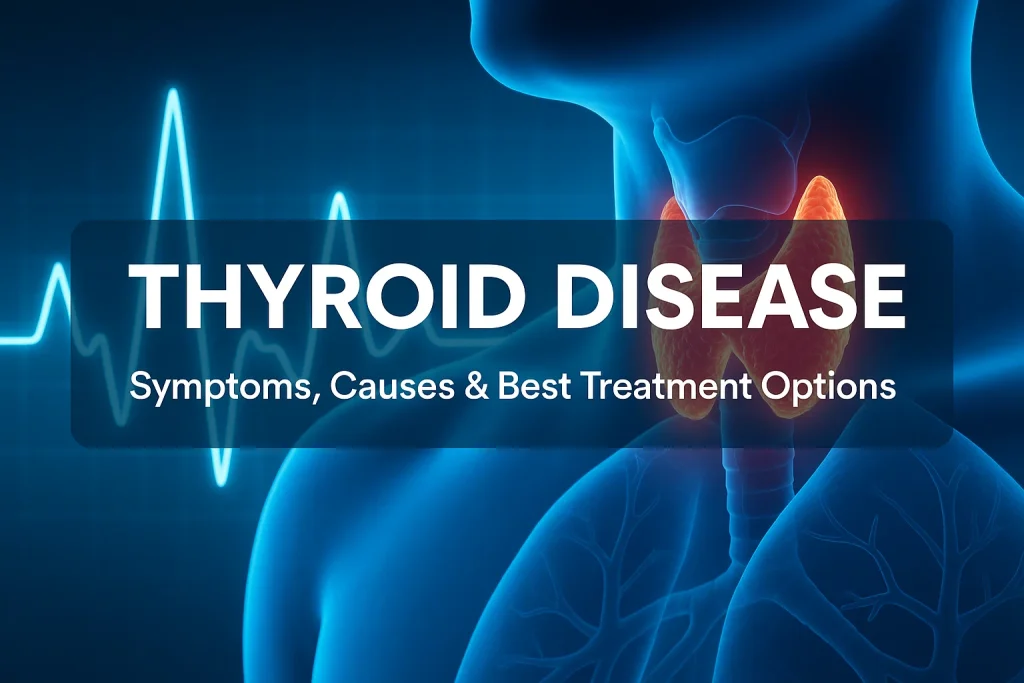
Thyroid Disease: Symptoms, Causes & Best Treatment Options
What is the thyroid gland?
The thyroid is a small, butterfly-shaped gland in your neck that plays an important role in your overall health. When this gland produces too much or too little hormone, it can lead to thyroid illness, which can impact your heart, mood, weight, and energy levels. This blog will help you understand many forms of thyroid problems (such as hypothyroidism and hyperthyroidism), common symptoms to look out for, and potential treatments.
What is thyroid disease?
Thyroid disease refers to a wide range of thyroid-related issues and diseases. Hormones produced by the thyroid maintain your body’s proper operation. There are two types of thyroid disease: hyperthyroidism and hypothyroidism.
Hyperthyroidism is the term for when the thyroid gland produces unusually large amounts of thyroid hormone. The body uses a lot of energy in this state, which can lead to weariness, a quicker heartbeat, weight loss, and other problems that can impact the metabolism.
In hypothyroidism, thyroid production is significantly lower than usual. You may experience fatigue, weight gain, and an inability to withstand cold conditions if your body’s thyroid hormone levels go too low.
What are the symptoms of thyroid disease?
Symptoms of thyroid disease depend on the type of medical condition you are experiencing. Symptoms of thyroid disease can be divided into two groups: some related to having too much thyroid hormone (hyperthyroidism) and some related to having too little thyroid hormone (hypothyroidism).
Symptoms of hyperthyroidism include:
- Irritability and nervousness
- Sleep issues
- Weight loss
- Goiters
- Irregular periods.
- Visual issues or eye discomfort.
Symptoms of hypothyroidism include:
- Amnesia (forgetfulness)
- Weight gain
- Heavy menstrual periods
- Having dry and thick hair
- Sensitive to chilly conditions
What causes thyroid disease?
There are mainly two types of thyroid disease that can affect a person, depending on what type of thyroid disease he is facing.
What is the cause of hypothyroidism?
Thyroiditis: This is caused by enlargement of the thyroid gland. Thyroiditis reduces the amount of hormones generated by the thyroid.
Postpartum thyroiditis: This illness affects 5% to 9% of women following delivery. This is typically a transient situation.
Iodine deficiency: The thyroid requires iodine to make hormones. Iodine deficiency affects many millions of people around the world.
Hashimoto’s thyroiditis: An autoimmune disease in which the body’s cells attack and harm the thyroid.
Thyroid gland failure: The thyroid gland often fails to operate properly from birth. It affects around one in every 4,000 babies. If not addressed, the youngster could suffer physical and mental injury.
What are the causes of hyperthyroidism?
Graves’ disease: characterized by an overproduction of hormones. This condition is also known as diffuse toxic goiter (enlarged thyroid gland).
Excessive Iodine: When your body has an excess of iodine (a mineral used to produce thyroid hormone), the thyroid produces more thyroid hormone than is required, resulting in hyperthyroidism.
Thyroiditis: This condition might be unpleasant or not felt at all. Thyroiditis occurs when the thyroid gland releases stored hormones. This could last for several weeks or months.
Risk Factors
- Females are five to eight times more likely to develop thyroid problems.
- Are above 60, particularly if you are female.
- Have a family history of thyroid disease.
- Have Turner syndrome.
- Take a high-iodine medicine.
- Living in a country or location without iodized table salt might result in an iodine shortage.
How is thyroid disease diagnosed?
Diagnosing thyroid disease can be challenging since its symptoms are so similar to those of other conditions that individuals can become confused. Similar symptoms may occur during pregnancy or as you get older. Fortunately, some tests can help determine whether your symptoms are caused by a thyroid condition. These tests include the following.
Physical examination—Your doctor may start with a physical examination, in which they check for an enlarged thyroid or any nodules in that region.
Blood tests—These tests can determine whether you have hypothyroidism or hyperthyroidism. Thyroid blood tests include TSH, T3, and T4, as well as thyroid antibody tests.
Imaging tests—Imaging tests, such as a thyroid ultrasound, help your provider in detecting nodules (lumps) and/or goiters. Nuclear medicine imaging, such as a thyroid uptake and scan, can assist in determining whether nodules are hyperactive.
How is thyroid disease treated?
Your doctor’s goal is to restore normal thyroid hormone levels. This can be accomplished in a variety of ways, with each treatment being determined by the underlying cause of your thyroid disease. Treatment options for hyperthyroidism may include the following:
Anti-thyroid drugs (methimazole and propylthiouracil): These treatments prevent your thyroid from producing hormones.
Beta Blockers: These prescriptions do not alter the amount of hormones in your body, but they do aid with symptoms.
Radioactive iodine: Affects thyroid cells, stopping them from producing excessive levels of thyroid hormone.
Surgery: Your healthcare professional may prescribe surgical removal of your thyroid (thyroidectomy) as a more permanent therapeutic option. This will stop it from producing hormones. However, you will have to take synthetic (made) thyroid replacement hormones (pills) for the rest of your life.
In case of low levels of thyroid hormone (hypothyroidism), treatment includes
Thyroid replacement medication: This is a synthetic method of reintroducing thyroid hormone into your body. One regularly prescribed drug is levothyroxine. Medications can help you control thyroid illness and live a normal life.
How to prevent thyroid disorders?
Here is the content converted into pointwise format:
- Thyroid disorders cannot be completely prevented. A diet low in iodine can lead to hypothyroidism. Here are some of the tips to prevent thyroid disorders.
- Soy foods may interfere with thyroid hormone production, so it is advised to limit their intake.
- It is important to take thyroid hormone medications in the correct dosage.
- Avoid consuming excess iodine-rich foods such as salt, seaweed, and fish in large quantities.
- Smoking negatively affects the thyroid glands and can contribute to thyroid disorders.
While thyroid disorders are rarely preventable, early diagnosis plays a key role in effective treatment.
Frequently Asked Questions
Can thyroid disease be cured?
All thyroid diseases can be treated, resulting in normal thyroid function. However, medication often needs to be taken to maintain normal thyroid status.
Can I live with thyroid disease?
Yes, you can live a normal life with the disease. Over time, your healthcare professional will keep an eye on your treatments and make necessary adjustments. Finding the best course of action to control your hormone levels may take some time.
Is thyroid disease serious?
Thyroid diseases can range from a minor goiter or enlarged gland to a potentially fatal thyroid cancer. However, the two most frequent thyroid diseases are associated with unusual thyroid hormone production. Both conditions are dangerous and require quick treatment.
How can I control my thyroid?
A balanced diet rich in iodine, selenium, and vitamin A; frequent exercise; stress management; a focus on lifestyle adjustments; and balanced nutrition can help control thyroid function.
Is OCD caused by hyperthyroidism?
Neurotransmitter activity in the brain can be affected by changes in thyroid hormone levels, which may result in mood and anxiety problems like obsessive-compulsive disorder. Thyroid issues are also linked to changes in the immune system and inflammatory reactions, both of which may contribute to OCD.







